This special issue of Sikh Formations is based on selected papers from the proceedings of 5th Sikh Studies Conference on ‘Sikhs and South Asians in the Public Sphere: Precarious Minorities and the New Global Politics of Religion’ held at the University of California, Riverside (UCR), on 12–13 May 2017. The participants in the conference came from universities in the United States, Canada, the United Kingdom, and India to share their scholarly presentations over the course of two days within eight panels organized on various topics connected to the overall conference theme. The Dr Jasbir Singh Saini Endowed Chair in Sikh and Punjabi Studies provided general financial support for it. The conference sponsors included Dr Jasbir Singh Saini Trust, the Sikh Foundation of Palo Alto, California and the Department of Religious Studies. Multi-Disciplinary Financial and Administrative Unit (MDU) staff, Diane Shaw (Financial & Administrative Officer), Diana Marroquin (Accounting Assistant), Ryan Mariano (Administrative and Event Assistant) and Celeste Townsend (Budget and Financial Officer) gave assistance in organizing this international event and helped with publicity. Much appreciation goes to my co-organizers, Professor Arvind-Pal Singh Mandair, for suggesting the rationale of the conference theme, and Dr Charles M. Townsend, for competently organizing the last-minute details of the conference program.
I wish to thank Interim Provost and Executive Vice Chancellor, Dr Cynthia (Cindy) Larive for her enthusiastic support for the conference and her participation at the reception. I am extremely grateful to the College of Humanities, Arts, and Social Sciences (CHASS) Dean, Dr Milagros Peña, for inaugurating the conference on Friday morning and for her welcoming remarks at the reception in the evening. Dr Narinder Singh Kapany, Chairman of Sikh Foundation of Palo Alto, Dr Harkeerat Singh Dhillon and Mrs. Saranjit Kaur Saini contributed energetically in many ways to build the new program in Sikh Studies at the University of California, Riverside. Their selfless and untiring support is much appreciated. I would like to thank my doctoral students – Cory Knight, Kathryn Phillips, and Richard Howick – for assisting me greatly with hospitality and other necessary arrangements for the conference, including taking up the role of respondents in the conference. A unique feature of this conference was to invite respondents to begin discussion of the papers from each panel. Most of these respondents were graduate students from various universities, including the UC campuses of Riverside, Irvine, Merced, and Santa Barbara, as well as the University of Michigan and other universities. In this regard, Tejpaul Singh Bainiwal (UC Riverside), John Cibotti (UC Riverside), Amrit Deol (UC Merced), Phillip Deslippe (UC Santa Barbara), Tavleen Kaur (UC Irvine), Conner Singh VanderBeek (University of Michigan, Ann Arbor) and Dr Nirinjan Kaur Khalsa (Loyola Marymount University, Los Angeles) did an excellent job in responding to various papers in different panels. In addition, a number of undergraduate students and members of Sikh Student Association (SSA) at UC Riverside assisted in various ways at the reception. I thank all of them for their timely help ().
Figure 1. Dr Cynthia Larive (Provost), Dr Peter Graham (Associate Dean), Dr Verne A. Dusenbery, Dr Pashaura Singh and Dean of CHASS Milagros Peña at Reception. © Photographs belong to University of California, Riverside.
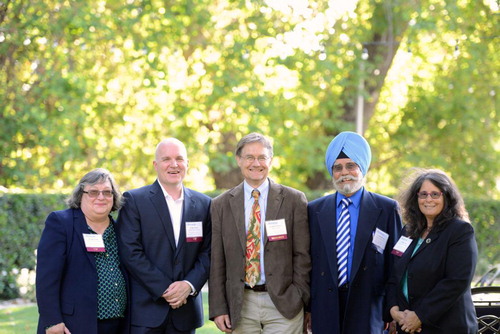
In this Preface, I have tried to put the conference into proper perspective by highlighting its rationale and various activities, while Arvind-Pal Singh Mandair has dealt with the interpretive discussion of various essays in the Introduction. Although the essays are well-documented and discuss certain sensitive issues in a scholarly fashion, the interpretations are the responsibility of the individual authors and do not necessarily reflect the viewpoints of the editors, the sponsors of the conference, the University of California, or the publishers. At the inaugural session on Friday morning, 12 May 2017, CHASS Dean Dr Milagros Peña greeted conference participants and guests. In her welcome address, she appreciated the efforts of the organizers to put together an impressive event in the field of Sikh Studies at UC Riverside. Dr Pashaura Singh introduced the conference theme. Notably, the conference incorporated four keynote speakers, each highly distinguished scholars whose presentations anchored the themes of the conference: Dr Naomi Goldenberg (University of Ottawa, Canada), Dr Timothy Fitzgerald (University of Stirling, UK), Dr Ivan Strenski (Professor Emeritus and first Holstein Distinguished Professor of Religious Studies at UCR), and Dr Pal Ahluwalia (University of Portsmouth, UK). The papers given by conference participants reflected a broad range of following themes, with most touching on issues surrounding Sikhs and other South Asian communities in the public sphere and relations with state power and the broader public within different national and political settings around the world: ‘Precarity and the State-form,’ ‘Majoritarianism, State Regulation, and Religious Identity,’ ‘Multiculturalism, Religion, and the Public Sphere’ and ‘State Resistances, Ethno-Nationalism, and Fascism.’ Scholars on the panels represented a wide range of interdisciplinary backgrounds and approaches, including Religious Studies, Humanities, History, Philosophy, Sociology, Anthropology, Ethnic Studies, Musicology/Ethnomusicology, Modern Languages, Women’s and Gender Studies, South Asian Studies, and so on.
In the context of precarious situations of minority communities around the world, it is pertinent to note that Sikhs have lived mostly as a minority community within the governing ambit of dominant non-Sikh political authorities. For the first two and a half centuries, for instance, they were part of the Mughal state and its subdivisions. Even during the brief period extending from late eighteenth century to the annexation of the Punjab to British India in 1849, when the Sikhs of the Punjab lived in their own sovereign state, they remained a numerical minority (roughly 12% of total population): a fact Maharaja Ranjit Singh (1780–1839) fully understood when he ruled in a manner designed to retain the support of the majority communities of both Hindu and Muslim affiliations among the population of the wider Punjab. Again, from 1849 to 1947 Sikhs were governed by the British during the colonial rule. In the post-colonial situation after 1947 they have been citizens of the Republic of India, and the successive territorial demarcation of the boundaries of the Punjab has been constituents of the sovereign Indian state. The achievement of a Punjabi linguistic state in 1966 after a long struggle did provide the Sikhs with a majority status in the Punjab, but still they had to deal with a second-order polity subordinate to the sovereign Republic of India (Kerr Citation1999). Sikhs are always in minority in the diaspora wherever they have settled. Unsurprisingly, being a minority community has been a constant factor in the evolution of the Sikh tradition and the formation and continual reformulation of the Sikh identity. Therefore, to be part of a precarious minority community is to be vulnerable to persecution, assimilation, destruction, ridicule, and neglect at the hands of the majority and the oppressive state structures.
In the first two decades of twenty-first century, there has been a major shift in the scholarly discourse of religion, a shift that has begun to impact the conventional self-understanding of the state as a secular entity. In scholarly circles it is now recognized that the dominant stories about religion, secularism and public life, we have become accustomed to hearing may be no more than myths that bear little or no relation to our everyday experiences and to political realities faced especially by minority communities. Spurred on by the perception that religion is neither merely private nor purely irrational, or that the public sphere is neither a realm of rational deliberation nor a smooth space of unforced assent, scholarship in this area has provided an increasingly sophisticated series of intellectual interventions that have challenged many of us to rethink our most basic categories of research, analysis and critique. Just as, in the past two decades, scholars in feminist, race and postcolonial studies raised fundamental questions about the construction of dominant social categories, so today, the very categories of religion and the secular are being revisited, reworked and reinterpreted.
The rethinking of such categories provides an important opportunity (and in some cases a sense of urgency) for reconsidering the precarious existence of minority cultures. This is perhaps best illustrated by the blurring of lines between religious and secular nationalisms in majoritarian democracies as culturally different as India, the US and Europe. And more recently by the confusing rhetoric of ‘religious freedoms’ which has led analysts to conclude that policy making by governments as it impacts minorities is now increasingly influenced by a new ‘global politics of religion.’ The main purpose of this conference was to analyze the impact of the new ‘global politics of religion’ on minorities’ cultures, using Sikhs and South Asians as the primary point of reference. While Sikh and South Asian studies have been relatively slow to register the rapidly shifting discourses of religion and the secular, events affecting South Asian minorities in North America, Europe and India have had tangible ramifications in the areas such as law, society, media, scholarship/education and politics, amongst others, thereby necessitating new and innovative approaches for analyzing the current precariousness of minorities (for instance Sikhs and South Asians in North America and Europe or Sikhs, Christians, Muslims and Dalits in India).
Most of the conference presenters addressed the following significant issues: What kinds of questions does the Sikh and South Asian case raise about our assumed liberal-democratic principles and practices of national integration, citizenship or multiculturalism? In what ways do secular principles and structures of government reinforce majority religious norms at the expense of religious minorities’ alternative claims to norms that govern participation in the body politic, as religious minorities? How do Sikhs and South Asian minorities respond to this environment, without being caught in the ‘trap’ of being marked as ‘especially’ religious? How have Sikhs and South Asians deployed or reacted to various forms of media in order to participate in the public sphere? In what ways can the relationship between South Asian cultures and modernity be recast in view of the ‘crisis of secularism’? More specifically in the case of Sikhs and Sikhism: Is it possible to rethink Sikh engagement in politics not only in the last 25 years but also in the last 100 years or so? Is it possible to think Sikhism (its value system and teachings) from a post-nationalist or post-secular perspective? How might this perspective engage or help to revision the current frameworks through which Sikhs and Sikhism are understood: multiculturalism, laïcité, ‘world-religions’ and so on? Are there any implications to questioning the very usefulness of the category of ‘religion,’ such as identification and growth and rise in numbers of Sikhs who identify themselves as ‘spiritual’ but not necessarily religious? How does the transformation of ‘secularist self-understanding’ affect those on the left, Punjabi culturists, Marxist Sikhs and so on?
The conference reception on Friday evening, 12 May 2017, at the UCR Alumni Center was a focal point for bringing the academic side of the field into conversation with the community. The participants and members of the broader local Sikh and UC Riverside communities shared a celebratory dinner and awards ceremony. All were warmly greeted and congratulated by Dr Cindy Larive, Interim Provost and Executive Vice Chancellor of UCR, and Dr Milagros Peña, Dean of the College of Humanities, Arts, and Social Sciences at UCR, who had also greeted conference attendees in the morning. Some of the excerpts from Dean Peña’s remarks are as follows:
… Religious Studies Department at the College is very exciting department where I have colleagues like Dr. Singh who has organized this conference. I do want to say that it is really a privilege to be the Dean of the College of Humanities, Arts and Social Sciences, especially a College in which the Department of Religious Studies [comes] … and the fact that they could bring a distinguished group of colleagues to come and do the Sikh conference, and that Dr. Singh … every time he does one, people just rave about the kinds of conversations that occur. I have looked at the program. We not only have colleagues who have come from India, but we also have colleagues who have come from the UK, from Canada, all over the United States and all over California. So I really want to welcome all of you, and thank you for participating in this two-day conference, and [I am] so glad to see so many of you here this evening as well. Thank you again, Pashaura, for this wonderful opportunity that you provide for many of us to have very stimulating and engaging conversations and debates that are very much at the forefront [of asking] the key questions in the study of religion. Thank you for your leadership … Footnote1
It is such a great pleasure to have the opportunity to welcome you here to the University of California, Riverside, and to be a member of our UCR family while you are here. UC Riverside is a very special university and we are so proud of our faculty and students, alumni and friends. And, we are really excited to share the university with those of you who are visiting at this weekend for this amazing conference, and the chance to exchange ideas, and really think deeply as a group about your research. As it turns out, I am only a chemist and so I am not a scholar of religion. But I certainly appreciate the diversity of thought and ideas and the opportunity to think about the role of religion in people’s lives. And, I want to share with you a little bit information about UC Riverside, about our diversity and why we are so proud of that. So UC Riverside is one of the most diverse Ph.D. granting universities in the country. This is important to us because it gives us the opportunity to help students develop intellectually, socially and emotionally in an environment that gives respect to other races, religions, cultures, genders and gender persuasions. And, we have environment at UCR, where if you go the Student Union, it is very typical to see people all mixed up at the tables. There are universities that have diverse groups. But when you go to some place where students are congregating, Afro-American students are at one table, Asian students at another table, the white students are over here in the corner. This is not what we see at Riverside. Part of it is sort of our DNA. This idea of the diversity of humans and the diversity of thoughts really enlivens our intellectual lives. So it is in that spirit that I welcome you here today. I would also like to recognize Dr. [Harkeerat] Singh Dhillon and Mrs. Dhillon for their donation for research award in Sikh Studies. These kinds of awards that enable students to do their work are really powerful in the lives of the students. I am a first generation college student myself. About 60 per cent of students at UC Riverside are first generation to go to university. I was lucky enough to get a scholarship from one of the co-inventors of Briggs and Stratton Engines, Steven Briggs. And, the fact that somebody, who I never met, had endowed this, it gave me some confidence in my own ability to be successful. So those gifts are powerful in terms of the work they enable. They are also powerful in what they say to our students. So I would like to thank you.Footnote2
Thank you so much for this award … What we have seen over the years is that endowed chair under Dr. Pashaura Singh has really blossomed and has done so well. I watched it so well because I was a trustee since 2004. I have roots and boots in this area. I know UCR well. What I have seen has been so amazing that he has reached out to community and he has reached out to scholars all over the world. And, it gives one confidence of anything that what we as community people can give will be looked after well and will be well utilized. At the junction at which we thought about this gift, Milly came into our lives and into UCR. And, just getting to know you has been amazing, [Milly]! The confidence has increased, because stewardship of any kind of gift is so important. And, one feels confortable in that … The only other thing I want to say is, I think, as parents we make the decision. But what I like to give credit to my daughters because when I mentioned it to them, there was not a moment of hesitation at all. They said that this is the right thing to do … Footnote3
The Dr. Jasbir Singh Saini Endowed Chair in Sikh and Punjabi Studies honors Harkeerat Singh Dhillon and Deepta Dhillon for their generous contribution to establishing an Endowed Research Award to support doctoral candidates engaged in Sikh and Punjabi Studies in Arts and Humanities. Riverside, California, Friday, May 12, 2017.
Figure 2. Provost and Executive Vice Chancellor Cynthia Larive giving her remarks at Reception. © Photographs belong to University of California, Riverside.
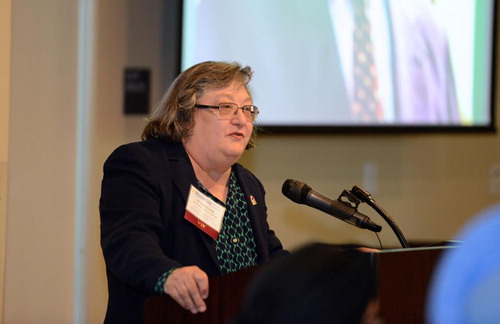
Our second honoree was Dr Ivan Strenski, Professor Emeritus from UCR’s Department of Religious Studies and first holder of the Holstein Family & Community Endowed Chair at UC Riverside. He is the author of 15 academic books and nearly 100 articles on topics such as the history of the study of religion, theory and method in the study of religion, the Durkheimian program for the study of religion, relations between religious ideology and political sacrifice in France, Muslim suicide bombers, Zionism, and the Israel/Palestine conflict. He has lately extended his writing into the domain of religion and law and published articles covering topics such as gay marriage, the Charlie Hebdo killings, and the Boston Marathon bombings. He has served as North American Editor-in-Chief of Religion, and now as an Associate Editor for The Journal of the American Academy of Religion (JAAR), and is an editorial board member of Politics, Religion and Ideology. He has been Faculty Research Lecturer at the University of California, Riverside, and has twice been awarded National Endowment for the Humanities fellowships. His prize-winning book, Four Theories of Myth in twentieth-Century History (1987) now appears in both Korean and Chinese editions (). Dr Strenski was both presented with a lifetime achievement honor for his broad and distinguished contributions to the academic study of religion, and treated dinner attendees to a keynote speech reflecting on the conference theme titled ‘Rumblings from the Belly of Leviathan: How Digestible are the Religions?’
Figure 3. Dean Milagros Peña honoring Dr Harkeerat Singh Dhillon, Deepta Dhillon and their two daughters. © Photographs belong to University of California, Riverside.
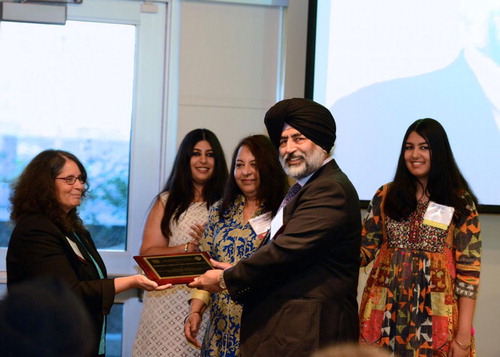
Figure 4. Dr Ivan Strenski receiving his honor plaque from Dr Pashaura Singh and Dr Charles M. Townsend. © Photographs belong to University of California, Riverside.
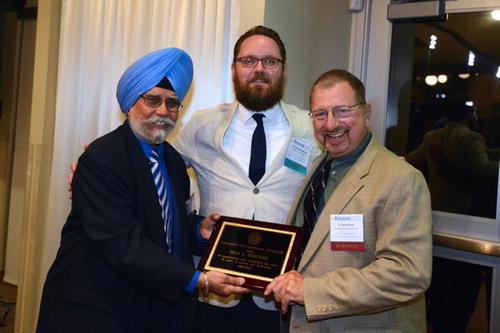
Our third honoree was Dr Verne (Van) A. Dusenbery, Professor of Anthropology and founding Chair of Global Studies at Hamline University in Saint Paul, Minnesota. He has longstanding interests in the Sikh diaspora, having done work with Sikhs in North America, Southeast Asia, Australia, and Punjab. His books include a collection of essays, Sikhs at Large: Religion, Culture, and Politics in Global Perspective (Oxford University Press, 2008), plus three edited volumes: The Sikh Diaspora: Migration and the Experience Beyond Punjab (Chanakya, 1989), with N. Gerald Barrier; A Punjabi Sikh Community in Australia: From Indian Sojourners to Australian Citizens (WNC, 2001), with Rashmere Bhatti; and Sikh Diaspora Philanthropy in Punjab: Global Giving for local Good (Oxford University Press, 2009), with Darshan Singh Tatla. Professor Arvind-Pal Singh Mandiar at University of Michigan, Ann Arbor and Dr Pashaura Singh, Saini Chair in Sikh Studies at UC Riverside, presented the award to him jointly. The text on the plaque reads: ‘The Dr. Jasbir Singh Saini Endowed Chair in Sikh and Punjabi Studies honors Verne Andrew Dusenbery with a lifetime achievement award for his distinguished contribution to the study of Sikh Diaspora. Riverside, California, Friday, May 12, 2017.’
Our final honoree was Dr Darshan Singh Tatla, Fellow in the Department of Punjab Historical Studies at Punjabi University, Patiala, India. His work covers a large body of publications focused especially on the academic study of the worldwide Sikh diaspora. His books include The Sikh Diaspora: The Search for Statehood (University of Washington, 1999), Sikh Diaspora Philanthropy in Punjab: Global Giving for local Good (Oxford University Press, 2009), with Verne A. Dusenbery, and Sikhs in Britain: The Making of a Community (University of Chicago, 2006), with Gurharpal Singh. He also edited two seminal annotated bibliographies of sources on the worldwide Sikh diaspora, Sikhs in North America (Greenwood, 1991) and Sikhs in Britain (Warwick, 1987), with Eleanor Nesbitt. Emeritus Professor Karen Leonard at University of California, Irvine and Dr Pashaura Singh, Saini Chair in Sikh Studies at UC Riverside, presented the award to him jointly. The text on the plaque reads: ‘The Dr. Jasbir Singh Saini Endowed Chair in Sikh and Punjabi Studies honors Darshan Singh Tatla with a lifetime achievement award for his distinguished contribution to the study of Sikh Diaspora. Riverside, California, Friday, May 12, 2017.’ Dr Verne A. Dusenbery received the award on his behalf and presented to him in England later on ().
Figure 5. Dr Verne A. Dusenbery receiving the plaque from Dr Pashaura Singh and Dr Karen Leonard on behalf of Dr Darshan Singh Tatla. © Photographs belong to University of California, Riverside.
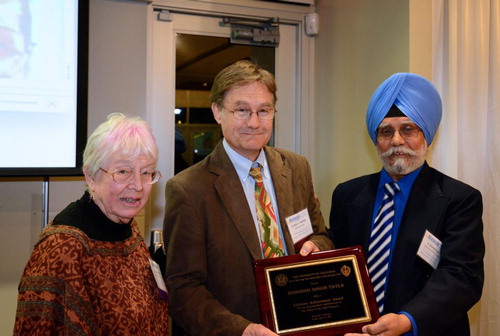
The main conference events came to a close in a different way than previous conferences by drawing the participants into a live theatrical performance of the play Kultar’s Mime, the hidden story of the 1984 Delhi pogrom as told by a Jewish Art Collective. The play, based on a poem written by Sarbpreet Singh and directed by his daughter J. Mehr Kaur, dramatized events surrounding the 1984 pogroms and massacres of Sikhs in India following the assassination of Prime Minister Indira Gandhi. After the emotional experience of viewing Kultar’s Mime, Sarbpreet Singh and the actors in the play drew the audience, made up of conference participants and members of local Sikh communities, into a powerful discussion of the true events that inspired the poem and play and audience members’ own memories of the events of 1984. As the final gathering of the conference, all conference participants and the performers of Kultar’s Mime were invited to share a meal and rich discussions at the home of Dr and Mrs. Harkeerat Singh Dhillon in Riverside.
Notes
1 The excerpts of Dean Milagros Peña’s speech were taken from the video recording of the reception program on Friday, 12 May 2017.
2 The excerpts of Interim Provost and Executive Vice Chancellor Cynthia Larive’s speech were taken from the video recording of the reception program on Friday, 12 May 2017.
3 This brief excerpt of Dr. Harkeerat Singh Dhillon’s speech was taken from the video recording of the reception program on Friday, 12 May 2017.
Reference
- Ian J. Kerr, 1999. “Sikhs and State: Troublesome Relations and a Fundamental Continuity with Particular Reference to the Period 1849–1919,” In Sikh Identity: Continuity and Change, edited by Pashaura Singh and N. Gerald Barrier. New Delhi: Manohar Publications, 147.
